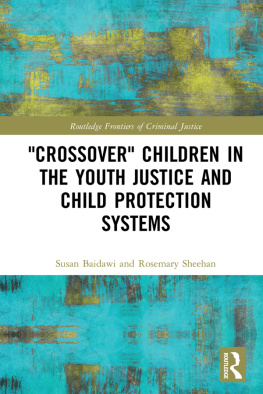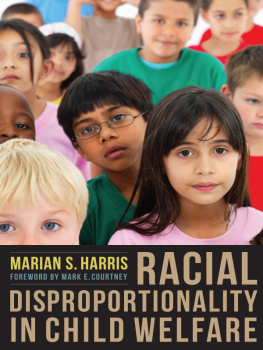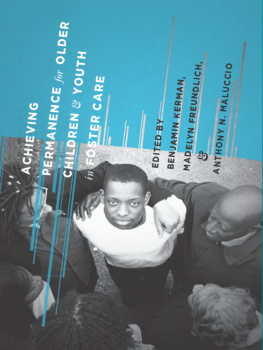Columbia University Press
Publishers Since 1893
New York Chichester, West Sussex
cup.columbia.edu
Copyright 2009 Columbia University Press
All rights reserved
E-ISBN 978-0-231-51852-9
Library of Congress Cataloging-in-Publication Data
Childhood, youth, and social work in transformation : implications for policy and practice / edited by Lynn M. Nybell, Jeffrey J. Shook, and Janet L. Finn.
p. cm.
Includes bibliographical references and index.
ISBN 978-0-231-14140-6 (cloth : alk. paper) ISBN 978-0-231-51852-9 (ebook) 1. Social work with children United States.2. Social work with teenagersUnited States.3. Child welfareGovernment policyUnited States. I. Nybell, Lynn M.
II. Shook, Jeffrey J. III. Finn, Janet L., 1956-
HV741. c5359 2009
362.7dc22
2008029831
A Columbia University Press E-book.
CUP would be pleased to hear about your reading experience with this e-book at .
Children and youth in the United States today, as well as in many other countries, are increasingly marginalized without having their physical and social needs met or their human rights honored. The social, political, economic, and cultural changes of the past quarter century have resulted in a substantial decline in the well-being of millions of children. Equally important, few policy decision-makers see meeting the needs of these children as a priority. As a result, the politics of childhood has shifted in the United States to emphasize responsibility for well-being far more heavily on the parental family than on the community or society. At the same time, institutions of social control in local communities have been granted great discretion in the ways they address childrens behavior in schools and neighborhoods.
This book by a respected group of social workers and social scientists raises provocative questions regarding our perspectives about children and youth in postindustrial U.S. society. There is at present considerable ambiguity in our views about dependence and independence, about caring and being cared for, about risk taking and responsibility for ones actions, and about societal responsibility for the well-being of children and youth. Considering that most Western countries, including the United States, have rapidly growing, aging populations that will depend heavily on the support of young people, one would think that greater care would be shown about the conditions of so many children and youth.
Written for students and practitioners of social work, this edited volume provides knowledge about the many dimensions of childhood and the institutions devised to provide for the development, care, and control of children. It helps social workers understand what it is like to be a child in the United States today, how others view childhood, and how social policies and institutions influence the well-being of children. The book examines many of the important social services sectors affecting our understanding of childhood today, including adoption, foster care, juvenile justice, teen parenting, human and legal rights, school exclusion policy and preschool programming, health care, and youth participation in developing and operating programs. It also suggests some alternative ways for addressing the challenges that we face.
First, some context: there are 73 million children below the age of 18 in the United States today, including 20 million below the age of 5. The proportion of children of color approaches 40%, and 20% have at least one foreign-born parent. These populations are distributed unevenly across the country, as are the 17% of children living below the poverty level. Problems are concentrated in urban centers, depressed rural areas, and a few states. The conception of childhood as a negative period is not limited to the poor or to children of color because some children grow up in great affluence but still experience profound problems, while other children are growing up homeless and in abject poverty.
Although predictions are always problematic, it is safe to estimate that before these 73 million children reach adulthood, about 5 million will have experienced out-of-home placement, another 34 million will have a parent or sibling who is or has been incarcerated, 25% may not have completed high school, about 51 per 100,000 will have died an accidental death as an adolescent, and nearly 100,000 will have been sentenced to placement in an adult jail or prison. Some 12% will have experienced maltreatment in the form of abuse or neglect, 21% will have a physical or mental health disability, and millions will have been victimized with no report filed of their victimization; although they suffer in silence, the impact is no less serious.
On the other side of the equation, assuming that we are entering a period when more federal policy will be directed to children and youth, we would expect that most young adults will have grown up with at least a national health care program for children. There will be millions of first- and second-generation immigrant children who are prepared for successful adult roles, and, when compared with children who matured in the 1990s and the early twenty-first century, many more will have benefited from quality child care. These children will also have benefited from entering adulthood at a time when racial and ethnic diversity is far more extensive in our society. Similarly, educational policy will have changed such that children and youth will be better prepared to participate effectively in a postindustrial society.
Last, and perhaps most difficult to estimate, is the type of physical and social environment these children will experience. It will probably have a more negative effect on children of color, poor children, and children with disabilities. The impact of the physical environment on childhood and youth is one of the elements that social workers seldom think about when considering social services for children and youth in the United States, but one needs only to point to the dramatic increase in childhood asthma to acknowledge the impact of environmental change on children, as many public health researchers have noted. On average, both children and youth are much more sensitive to the physical environment of their country and community than are adults, and it can be expected that they will demand that far more be done in the future than is being done now. Very young children are now keenly aware of environmental policies and encourage adult compliance, but they require the active involvement of adults in environmental protection for the decades ahead, as we struggle to develop a future world in which all can live. As a number of contributors to this volume show, young people are critically observing and assessing their worlds, and they are important contributors to changes in programs, communities, and public policies.
A growing and deeply troubling problem today is the trafficking and sexual exploitation of children and youth in the United States and many other countries. These boys and girls are so badly damaged that childhood has almost no meaning for them. Even in the United States there are cases of parents trafficking their own children; when the situation is identified, the child or youth is taken by the court and institutionalized for neglect, while, too often, the parent escapes legal consequences.






 New York
New York